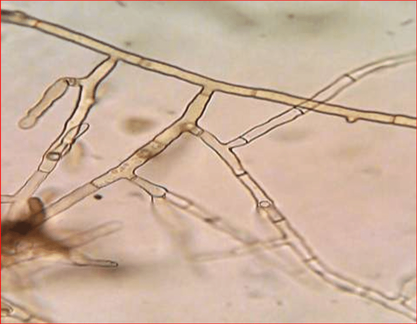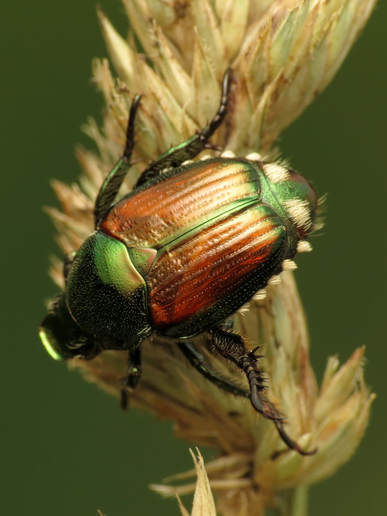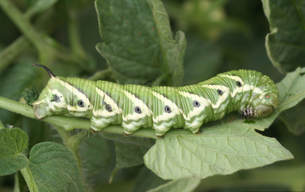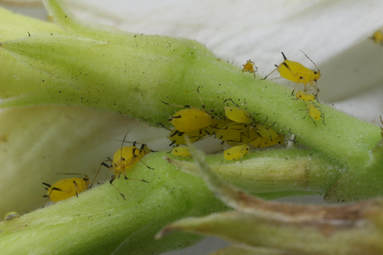 Rhizoctonia solani Rhizoctonia solani A recently-released study from an international group of scientists and researchers (link to PDF) shows that vermicompost (compost produced by worms) not only improves crop productivity, but actively fights fungal attacks that can destroy harvests. This is great news, not only for organic farmers, but also home gardeners who are looking to boost their harvest and prevent fungal outbreaks without using harmful synthetic fungicides and fertilizers. Their scientific conclusion: "The application of vermicomposting to agricultural land increases productivity by a multifaceted impact on soil health and crops, facilitating nutrient enrichment and preventing pathogen development. Vermicompost and its derivatives, such as vermiwash [liquid extract produced from earthworm-rich vermicompost], along with associated decomposer bacteria, act against fungal pathogens. The antifungal efficacy of vermicompost may be associated with bioactive compounds present in the CF [coelomic fluid], mucus, skin secretion of earthworms and metabolites secreted by decomposer bacteria. The CF of earthworms has an inherent ability to defend worms against diseases. It inhibits the growth of a variety of fungal pathogens, such as Rhizoctonia solani, Alternaria solani, Aspergillus niger, A. flavus, Fusarium oxysporum, and F. graminearum. The metabolites from vermicomposting bacteria, CF, mucus, and skin secretion synergistically combat phytopathogenic fungi. As an organic product, vermicompost and its derivatives are environmentally friendly. Thus, these products should be used to boost agricultural productivity by nutrient enrichment and reduction of plant fungal diseases." The layperson's summary: Worms which break down organic matter have to be able to fight off harmful bacterial and fungal pathogens in the soil, so they secrete fluids from their bodies to do this. These fluids are also present in the vermicompost (their poop) that we apply to the soil in our pots and gardens. Therefore the study shows that because of the composting worms' fluids present in the vermicompost, their vermicompost also acts as an antifungal agent for your plants. To order Living Worm Compost for your garden and potted plants, click here.
0 Comments
 This is the third story in a three-part series on how to deal with garden pests chemical-free. Garden pests—we all get them, but how do you deal with the pests without spraying chemicals on your food? No worries we are here to help! The final pesky garden pest we'll discuss are Japanese Beetles. I hate to say it, but Japanese Beetles are actually quite beautiful, with blue-green heads and copper backs. These small beetles are about a half inch long, travel in groups, and eat almost any plant. Favorite feasts for this pest include roses, beans, and raspberries. Japanese beetles start out as grubs in your soil then emerge in June as adult beetles. As grubs, they destroy the roots of your grass before coming to the surface to then attack your plants. While their adult life is only 40 days, they can easy destroy your garden if left unchecked. So what is a chemical free gardener to do? Luckily you have quite a few options! I seem to deal with Japanese Beetles every season since moving to West Michigan. Even if you do not have grubs in your soil the Japanese Beetles can easily fly over from your neighbor’s yard. Row covers are quite effective in protecting plants if used during the beetles life cycle. If covering your crops isn't your game, hand picking the beetles in the morning when they are most active is quite easy, as they are quite slow. As I catch the pests, I put them into a bowl of water. If you have chickens, your feathered friends will enjoy the treat. If you are not going to feed the beetles to another animal add dish soap to the water so they cannot fly away. When handpicking just isn’t enough you can spray your plants with Neem Oil. I spray my roses with Neem Oil since handpicking around the thorns isn’t practical. If you see Japanese Beetles in your garden don’t stress! You are now armed with a plan of attack to save your season. Happy gardening!  This is the second in a series on how to deal with garden pests chemical free. Garden pests—we all get them, but how do you deal with the pests without spraying chemicals on your food? No worries we are here to help! One fine summer morning I strolled out to my garden only to find my tomato plants nearly half eaten. The tomato hornworm strikes again. Easily identifiable the plump bright green with white and black markings the tomato hornworm (also known as the tobacco hornworm) can destroy a tomato plant in a no time at all. If you find one be assured, there are others lurking nearby. Especially check the underside of leaves and the stems of your plants to find these pests. So what is a chemical free gardener to do? Handpicking is the best organic solution to these pesky caterpillars. Simply pluck them off and either crush or drop into a bucket of soapy water. Don’t be alarmed by the fierce horns the tomato hornworm displays they cannot pinch, bite or attack you. One way to prevent tomato hornworms from ever striking is tilling your soil as this kills larvae before they become the dreaded caterpillars. Another method is to plant marigolds, basil or dill to deter these pests from entering your garden. Finally, a product called Bacillus Thuringiensis is great for killing caterpillar-stage insects. Happy gardening!  This is the first in a series on how to deal with garden pests chemical free. Garden pests—we all get them, but how do you deal with the pests without spraying chemicals on your food? No worries, we are here to help! The first garden pests we’ll deal with are aphids. Aphids also come in variety of colors ranging from bright green to brown or even pink. These little buggers are so small, sometimes you cannot even see them on your plants. So how do you know they are there? The leaves of your plants will begin to curl and turn yellow. The plants will also feel sticky and ants will be attracted to this sticky substance. For a pest so small, they can cause a lot of damage on your young plants as well as your established plants. They feed on plant juices by attacking leaves, stems, flowers, buds and even the roots. Basically they will suck your plant dry potentially killing if left untreated. So what is a chemical free gardener to do? Luckily you have quite a few options! A few seasons ago the Good Sweet Earth garden was attacked full force by aphids. I promptly ordered a slew of ladybugs. The beneficial ladybug feeds on aphids and controls the population. After a few days I didn’t see any aphids or ladybugs, but thankfully the ladybugs come back each season. While waiting on the ladybugs in the mail I blasted my plants with cold water and also used a mix of soapy water to spray on the bottom of the leaves. Dusting your plants with flour can also deter aphids. Finally, Neem Oil is a great option for knocking out aphids. If you see aphids or suspect aphids in your garden don’t stress! You are now armed with a plan of attack to save your season. Happy gardening! |
